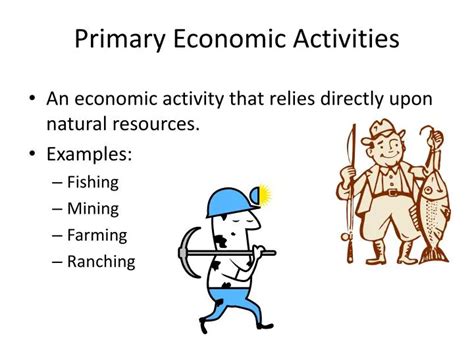Primary economic activities involve the extraction or harvesting of raw materials from the Earth. They form the foundation of most economies and provide essential resources for all sectors of society.

Key Economic Sectors
Primary Economic Activities:
- Agriculture: Growing crops, raising livestock, fishing, and farming
- Mining: Extracting minerals, metals, and other resources from the Earth’s crust
- Forestry: Harvesting and managing forests for timber, pulp, and other products
- Fishing: Catching and harvesting aquatic resources
Secondary Economic Activities:
- Manufacturing: Transforming raw materials into finished goods
- Construction: Building and maintaining infrastructure, homes, and businesses
- Utilities: Providing electricity, water, and communication services
Tertiary Economic Activities:
- Services: Providing intangible goods, such as education, healthcare, and entertainment
- Finance: Managing and lending money
- Tourism: Providing experiences and attractions for travelers
Primary Economic Activities and GDP
Globally, primary economic activities contribute significantly to Gross Domestic Product (GDP). According to the World Bank, agriculture accounts for approximately 4% of global GDP, while mining and forestry contribute an additional 2%.
Importance of Primary Economic Activities
- Provide Raw Materials: Primary activities supply essential resources for all industries.
- Food Security: Agriculture ensures food production for growing populations.
- Employment: Mining, forestry, and fishing provide livelihoods for millions worldwide.
- Economic Development: Primary activities often drive economic growth in developing countries.
- Environmental Sustainability: Responsible management of natural resources is crucial for sustainable development.
Common Mistakes to Avoid
- Overexploitation: Excessive extraction or harvesting can deplete natural resources.
- Environmental Degradation: Mining and other primary activities can damage the environment if not managed responsibly.
- Ignoring Local Communities: Engaging with local communities is essential for social and environmental sustainability.
- Lack of Investment: Underinvestment in primary activities can hinder economic growth and development.
- Policy Neglect: Government policies should promote responsible use of natural resources and support primary economic activities.
How to Enhance Primary Economic Activities
- Promote Sustainable Practices: Adopt environmentally friendly mining, fishing, and forestry techniques.
- Invest in Technology: Use technology to improve efficiency and reduce environmental impacts.
- Foster Innovation: Explore new methods for extracting, harvesting, and processing raw materials.
- Support Rural Development: Invest in infrastructure, education, and healthcare in rural areas to support primary economic activities.
- Create Value Chains: Connect primary producers with manufacturers and service providers to maximize economic benefits.
Tables
| Sector | Contribution to Global GDP |
|---|---|
| Agriculture | 4% |
| Mining | 2% |
| Forestry | 0.8% |
| Fishing | 0.4% |
| Benefits of Primary Economic Activities |
|—|—|
| Raw material supply |
| Food security |
| Employment |
| Economic development |
| Environmental sustainability |
| Challenges in Primary Economic Activities |
|—|—|
| Overexploitation |
| Environmental degradation |
| Ignoring local communities |
| Lack of investment |
| Policy neglect |
| Strategies to Enhance Primary Economic Activities |
|—|—|
| Promote sustainable practices |
| Invest in technology |
| Foster innovation |
| Support rural development |
| Create value chains |
